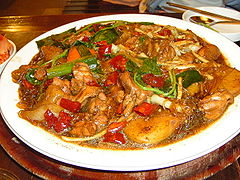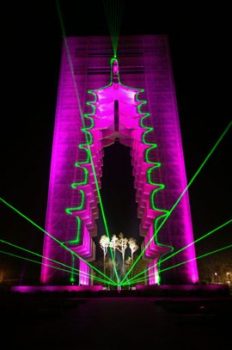Korean Waterfalls Posted by Ginny on Sep 12, 2011
Some people mistakenly believe that all the waterfalls in South Korea are in Jeju Island (제주도), (If you don’t know what I mean, go here: https://blogs.transparent.com/korean/korean-waterfalls) but that’s simply not true. There are waterfalls all over Korea, including one in Donghae City (동해시) of Gangwon Pronvince (강원도) called Ssang Falls (쌍푹포). Ssang Falls is a…
Andong Posted by Ginny on Sep 6, 2011

South Korea is rapidly becoming a technologically advanced country with modern cities. A city called Andong (안동) is an exception to the norm. Andong has a reputation for being a center of traditional Korean culture and history. There are many festivals that take place in Andong that celebrate ancient Korean traditions. For example, the Andong…
Korean Festivals in September Posted by Ginny on Sep 3, 2011
It’s still not too late to attend the various festivals that take place in South Korea. The Yangyang Songi Festival (양양송이축제) will begin the 29th of September and will take place in Yangyang County in Gangwon Province (강원도). The Yangyang Songi Festival is a pine mushroom festival that features pine mushroom taste testing booths, pine…
Cute Korean Children’s Song Posted by Ginny on Aug 31, 2011
There is a popular Korean children’s song that describes some of the features and shapes of faces by using various fruits and vegetables. If you look at the song, the song uses the example of a 호박 (hobak) or squash to describe a characteristic of a face. Generally when someone’s face is said to look…
Traditional Korean Mask Dances Posted by Ginny on Aug 30, 2011
There are several Korean mask dances that are considered important intangible cultural properties because they represent Korean culture and history. The Yangju byeolsandae nori (양주별산대놀이) is a mask dance that is Intangible Cultural Property #2. The dance is from the Yangju Region and is known throughout Gyeonggi Province (경기도). Korean mask dances like this one…
Korean Homophones Posted by Ginny on Aug 27, 2011
Homophones are words that are pronounced the same but have a different meaning. Here are some of the most common Korean homophones: Horse (말) Ex: 말을 타기 싫다 = I don’t like to ride a horse Word/speech/speak/talk/language (말) Ex: 약간 망설이다가 그는 말하기 시작했다 = After a slight hesitation he began to speak Three (세)…
Gyeongju Posted by Ginny on Aug 18, 2011

Gyeongju (경주) was the former capital city of Silla (신라). The Silla Kingdom formerly ruled the Korean Peninsula and traces of its existence can be seen all over Gyeongju. For example, the Cheomseongdae (첨성대) is an astronomical observatory that dates back to the Silla Period. The Cheomseongdae is an important discovery because as of yet…


